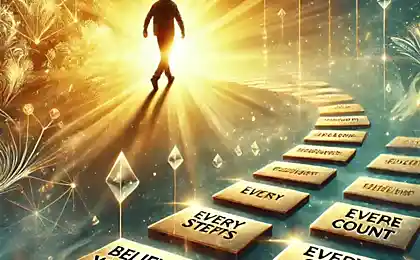299
7 truths that are important to understand in time

Each person has his own bitter experience - the experience of mistakes, doubts, defeats. We are brought up in different cultural traditions, each of us has its own family history, its own system of values. But there are some fundamental truths that humanity has confirmed over and over again, regardless of time and place. By understanding them in time, we can not only avoid unnecessary stress and drama, but also reveal a deeper attitude to life.
Often people realize the essence of these truths only after a series of difficult trials or under the yoke of disappointment and loss. But if you wish, you can walk the path to wisdom more consciously by listening to the testimony of others. We cannot “live” someone else’s bitter experience, but we can pick up the signals that fate sends us and make wiser decisions in advance.
In this article, we will look at seven key truths to understand before a crisis erupts or years of senseless suffering accumulate. The material is aimed at a wide adult audience and is written in a popular science style, combining accessibility with a depth close to the expert level. The goal is to show how some simple life lessons can become the basis for a more fulfilling and harmonious life.
Main part
1. Mistakes are an inevitable part of development
When we learn to walk, we don’t blame ourselves for every fall. However, as adults, we often attach too much importance to failure. Yes, mistakes can be painful, but to deny yourself the right to make a mistake means to deprive yourself of the opportunity to try something new and gain knowledge through practice.
- Point of growth: In psychology, the concept of “growth mindset” is associated with a positive perception of errors as a point of growth.
- Perfectionism: Perfectionism makes a person extremely vulnerable, because even a small mistake is perceived as a disaster.
2. Time is the most valuable resource
Many of us strive for financial stability, career growth, recognition in society. We often forget that hours and days go away. In the pursuit of external achievements, we sometimes sacrifice relationships, health and joy from small things.

Getting your priorities right means understanding your personal meaning in life. If you value family, friendship, creativity, or a healthy lifestyle, make time for that. After all, it will be much more difficult to return missed opportunities than to earn additional money.
- The power of small action: Even 15 minutes a day spent reading an important book or chatting with family can be more valuable than an extra hour spent on social networks.
- Conscious no: The ability to abandon non-urgent and non-essential tasks frees up time for key priorities.
3. Happiness is an inner state, not an outer reward.
Our society promotes the idea: “If you earn a lot, have a status, you will become happy.” In fact, happiness is rather a subjective perception of reality, a level of life satisfaction and positive emotions.
According to the World Happiness Report, material wealth is important only up to a certain bar, covering basic needs. Once achieved, psychological factors such as relationship quality and personal fulfillment have a greater impact on happiness.
- External incentives: A luxurious car, a high position bring short-term satisfaction, but do not guarantee long-term harmony.
- Internal resources: The ability to notice joy in the ordinary, to thank for what you have, and to live in accordance with your values is much more secure “binds” us to a state of happiness.
4. Relationships are reciprocity, not a one-sided sacrifice.
In family and friendly life, people often suffer from the fact that they invest all their strength in the relationship, but do not receive adequate returns. The truth is that healthy connections involve balance – giving, you should also be entitled to support and involvement from the other.
- Relationship boundaries: Learn to say no if you feel you are being used or your resources are being depleted.
- Communication: Sometimes partners and friends sincerely do not know about your needs and are ready to meet, you just need to openly talk about it.
5. Health is an integral part of a happy life
Youth often creates the illusion of invulnerability: we think we can’t get enough sleep, we can’t balance our diet, we can ignore our body’s signals and still be in good shape. However, the bill for such a careless attitude can come suddenly. Understanding the importance of a healthy lifestyle in time, you can avoid many diseases and a constant feeling of fatigue.
- Regular physical examinations: Even if nothing hurts, preventive checks help to identify problems in time.
- Physical activity: moderate sports or at least a daily walk stimulate blood circulation, strengthen immunity and increase the psycho-emotional state.
- Mental health: Stress is one of the key factors undermining the body. Relaxation practices, meditation and healthy sleep are essential.

6. The past can not be changed, but you can change your attitude towards it.
Many of us spend a lot of mental resources chewing past grievances, mistakes, missed opportunities. “If I had done it differently then...” is a phrase that can ring endlessly in my head. But the past, however painful, remains a fact.
However, we can influence the “interpretation,” the meaning we give to these events. Instead of bitterness and self-addiction, you can try to take lessons and say to yourself, “It was an experience that made me who I am today.” ?
- Rethinking techniques: Try to write down on paper what skills or insights you have gained from a difficult situation.
- Adoption: Sometimes it’s important to just admit, ‘Yes, I was hurt and that’s part of my story, but now I want to move on.’ ?
7. You don’t have to live up to other people’s expectations.
In today’s world, it’s easy to fall into the trap of being a “good kid” for parents, a “smart student” for teachers, and a “successful professional” for colleagues. But in this quest to live up to others’ expectations, it’s easy to forget your own dreams and values. The truth is that you don’t have to “please” everyone by sacrificing your authenticity.
- Respect your uniqueness: By borrowing someone else’s goals, you miss the chance to figure out what really inspires you.
- Learn to say no: The ability to defend one’s position without guilt is an essential element of personal freedom.
- Balance between personal and social: Yes, we all live in a society and cannot completely ignore the opinions of others. It is always important to know what you want yourself.
Conclusion
The bitter experience of mistakes, doubts and defeats is an integral part of human life. It can lead to stagnation and frustration if it is not learned, or it can become a powerful catalyst for personal growth if it is able to accept certain “inevitable truths.”
The seven truths mentioned in the article remind us that mistakes do not make us worse, time is more expensive than money, happiness is born within, relationships are based on reciprocity, health requires care, the past is irreversible, and it is not our duty to meet other people’s expectations. Each of these positions can radically change the quality of life and help to avoid unnecessary suffering in the future.
There is no universal “right” way, and no one is saying that realizing these truths immediately guarantees a cloudless existence. However, understanding and accepting fundamental principles builds more adequate expectations and teaches you to be more meaningful about yourself and the world around you.
Wisdom is not only the ability to avoid mistakes, but also the ability to benefit from them without losing faith in yourself. The sooner you learn these life lessons, the less you will have to learn “through pain” and the faster you will be able to switch energy from the endless correction of “past mistakes” to active creation of the present and future.























